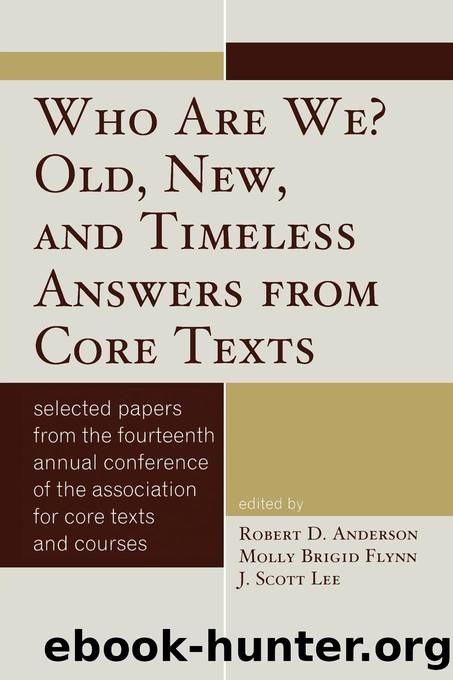Who Are We? Old, New, and Timeless Answers from Core Texts by Anderson Robert D.;Flynn Molly Brigid;Lee Scott J.; & Molly Brigid Flynn & J. Scott Lee

Author:Anderson, Robert D.;Flynn, Molly Brigid;Lee, Scott J.; & Molly Brigid Flynn & J. Scott Lee
Language: eng
Format: epub
Publisher: UPA
Published: 2011-08-15T00:00:00+00:00
Works Cited
Aristotle. Nicomachean Ethics. Trans. Joe Sachs. Newburyport: Focus, 2002.
---. On the Soul. Trans. J.A. Smith. In The Complete Works of Aristotle I. Ed. J. Barnes. Princeton: Princeton UP, 1984.
Spaemann, Robert. Happiness and Benevolence. Trans. Jeremiah Alberg. Notre Dame: U Notre Dame P, 2000.
Two Meditations on the Nature of Self
Roosevelt Montás
Columbia University
âWho am I?â is about as basic a question as one can ask. But, in the spirit of Descartesâs attempt in the Meditations to dismantle all assumptions about his own knowledge and reduce his attention to the most elementary level of inquiry possible, we might propose the more fundamental question âWhat am I?â The relative pronoun âwhoâ already carries in it a set of assumptions â ultimately metaphysical assumptions â about the nature of the kind of thing that can answer the question. Specifically, the pronoun âwhoâ carries ontological presuppositions â embedded in the logic of human languages and perhaps in the cognitive structures of our brains â about personal identity and agency. Not just anything can answer the question âwho?â Only a discrete, personal â or personalized â agent can answer to that pronoun. The notions of unitary identity and agency are so indispensable to the way we interact with the world that their metaphysical foundations are virtually invisible. In the technical sense of âtaking for granted what one sets out to prove,â to ask âwho am I?â is already to beg the question at the most elementary level. So, to think about this subtlest of questions in Descartes and Marcus Aurelius, I want to shave it down to elementary form, âWhat is the self?â That is the question that I want to, as it were, thread through the two texts called Meditations.
Descartes is closer to us than Marcus Aurelius both in time and in the metaphysical worldview he assumes. His ontological assumptions are very much like our own, despite the fact that, as we all know â and Nietzsche made explicit â God did not survive the epistemological revolution Descartes himself helped launch in the seventeenth century. So let us look first at Descartes and at the answer we get to the question âWhat am I?â in his brilliant Meditations on First Philosophy of 1640/41.
Descartes begins his Meditations with a mental exercise in which he tries to doubt everything â and he means everything. To help this exercise, he imagines an all-powerful evil genius that can deceive him about everything â even about mathematical truths: he grants that he can even be deceived in âcounting the sides of a squareâ (61). But Descartes quickly tells us that the one thing he cannot bring himself to doubt, even with this evil genius working on him, is his own existence. And he cannot doubt his own existence because the very act of doubting â that mental operation â immediately establishes existence. So he declares that âthis pronouncement âI am, I existâ is necessarily true every time I utter it or conceive of it in my mindâ (64). This is a very compelling argument.
Download
This site does not store any files on its server. We only index and link to content provided by other sites. Please contact the content providers to delete copyright contents if any and email us, we'll remove relevant links or contents immediately.
Macmillan Primary Grammar 2 Pupil's Book by Unknown(434)
Figuring Out Fluency in Mathematics Teaching and Learning, Grades K-8 by Jennifer M. Bay-Williams & John J. SanGiovanni(394)
The Principal's Guide to Curriculum Leadership by Sorenson Richard D.;Goldsmith Lloyd M.;Mendez Zulma Y.;Maxwell Karen T.;(309)
Learning from Accidents 3rd ed by Trevor Kletz (2001)(280)
English Grammar Practice--The Noun by Roxana Nastase(269)
Harnessing Technology for Deeper Learning by Scott McLeod(265)
Text-Dependent Questions, Grades K-5 by Douglas Fisher & Nancy Frey & Heather Anderson & Marisol Thayre(254)
A Guide to Curriculum Mapping by Hale Janet A.;(238)
English Language Program Administration by Unknown(234)
How to Do Everything with Google Tools by Unknown(232)
The Grammar Teacher's Activity-a-Day by Jack Umstatter(220)
Deep Change Leadership by Reeves Douglas;(218)
The Power of SMART Goals by Conzemius Anne;O'Neill Jan; & Anne Conzemius(205)
Functional Neuroradiology: Principles and Clinical Applications by Scott H. Faro (editor) Feroze B. Mohamed (editor)(189)
Using Data to Close the Achievement Gap by Johnson Ruth S.;(189)
Using Equity Audits to Create Equitable and Excellent Schools by Skrla Linda E.;McKenzie Kathryn B.;Scheurich James Joseph;(183)
Aligning and Balancing the Standards-Based Curriculum by Squires David A.;(183)
Beyond the RTI Pyramid by Bender William N.;(183)
Skill Building for ESL and Special Education : Student Textbook by Kristine Setting Clark(179)
